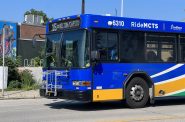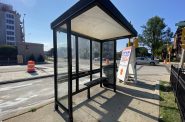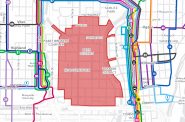State Should Add Interstate Tolls
Could raise $29 billion over 30 years, solving highways shortfall.
![The open road tolling lanes of the West 163rd Street toll plaza, going northbound on the Tri-State Tollway near Hazel Crest, Illinois. Photo by Mrschimpf at en.wikipedia [CC BY-SA 3.0 (http://creativecommons.org/licenses/by-sa/3.0) or GFDL (http://www.gnu.org/copyleft/fdl.html)], via Wikimedia Commons.](https://urbanmilwaukee.com/wp-content/uploads/2017/04/163rd_Street_Open_Road_Tolling_Lane.jpg)
The open road tolling lanes of the West 163rd Street toll plaza, going northbound on the Tri-State Tollway near Hazel Crest, Illinois. Photo by Mrschimpf at en.wikipedia [CC BY-SA 3.0 (http://creativecommons.org/licenses/by-sa/3.0) or GFDL (http://www.gnu.org/copyleft/fdl.html)], via Wikimedia Commons.
But a second WisDOT report offers a way out. Extensive research done last year for the DOT by the consulting firm HNTB, at the 2015 Legislature’s request, analyzed the feasibility of using toll finance to rebuild and modernize the state’s Interstate highways. Many of these vitally important corridors are nearing the end of their 50-year design life and need to be rebuilt.
A 2011 study that I carried out for the Wisconsin Policy Research Institute estimated that rebuilding and selectively widening all of these urban and rural Interstates would cost $26 billion (in 2010 dollars). If those projects could be financed by toll revenue over the next 20 years, that would free up existing federal and state gas tax dollars to address the shortfall in the rest of the highway system.
The HNTB study did not address the cost of rebuilding the Interstates, but it did make conservative estimates of how much toll revenue could be raised from users of the improved corridors, using all-electronic toll collection (no toll booths or plazas). The study’s mid-range revenue estimate was $29 billion over 30 years at an average passenger car toll of 8 cents per mile. (Tolls might start at 5 cents per mile and be increased annually by the rate of inflation.) Since my $26 billion estimate was in 2010 dollars, the cost might be a bit higher than the projected revenue of $29 billion, due to construction cost inflation since 2010.
Both federal programs have only a few openings. The three-state pilot program has two open slots, because two former slot-holders didn’t make use of them by the deadline that Congress set. Missouri continues to hold its slot, aiming to use toll financing to reconstruct aging I-70 with the addition of dedicated truck lanes.
Both houses of Indiana’s legislature have passed bills that would authorize their governor to apply for one of those two slots. There is serious legislative interest in Connecticut and tolling talk in several other states, including Massachusetts and Rhode Island. If the Wisconsin Legislature fails to act this session, the remaining two slots may be taken this year.
As for the federal Value Pricing Program, it’s a membership program for states that wish to implement variable tolling (having the toll vary with the level of traffic, like a market price, to keep traffic free-flowing). The program also has only two slots available. Only states that are members are eligible to implement variable tolling on a congested urban Interstate. Connecticut and Illinois are both members; Wisconsin is not. That, too, is an opportunity that might not exist by next year’s legislative session.
The Legislature need not decide this session that Interstate tolling is the way to go. But if toll-financed Interstate reconstruction is a serious possibility after further study and debate, Wisconsin’s applying to one or both of these federal programs this spring can be seen as an insurance policy. The HNTB study is more comprehensive and detailed than anything Indiana has done, so an application from Wisconsin is likely to be taken seriously by the Federal Highway Administration.
Tolls are not everyone’s cup of tea, but thanks to its robust tolling program for major highways, Illinois is moving ahead with widening and reconstruction projects comparable to those that are stalled in Wisconsin. High-quality infrastructure is a key factor in business location decisions and economic competitiveness. Wisconsin needs to solve its highway funding shortfall, and toll-financed Interstate modernization is a powerful tool for doing so.
Robert W. Poole Jr. is director of transportation policy at the Reason Foundation, which he co-founded in 1978.
This story was originally published by the Wisconsin Policy Research Institute.
Op-Ed
-
Unlocking Milwaukee’s Potential Through Smart Zoning Reform
 Jul 5th, 2024 by Ariam Kesete
Jul 5th, 2024 by Ariam Kesete
-
We Energies’ Natural Gas Plans Are A Mistake
 Jun 28th, 2024 by John Imes
Jun 28th, 2024 by John Imes
-
Milwaukee Needs New Kind of School Board
 Jun 26th, 2024 by Jordan Morales
Jun 26th, 2024 by Jordan Morales
Transportation
-
MCTS Adds 28 New Buses
 Jul 13th, 2024 by Graham Kilmer
Jul 13th, 2024 by Graham Kilmer
-
MCTS Designing New Bus Shelters
 Jul 10th, 2024 by Graham Kilmer
Jul 10th, 2024 by Graham Kilmer
-
MCTS Updates RNC Bus Detours To Better Serve Downtown, Riders
 Jul 9th, 2024 by Jeramey Jannene
Jul 9th, 2024 by Jeramey Jannene





















The Wisconsin Legislature has correctly focused on increasing our gas tax to reflect the increased cost of highway maintenance and expansion. That effort has been stalled by a Governor with presidential aspirations that does not want to face accusations of increasing taxes. (A no-no if you want money from the far right millionaires.)
If Wisconsin would look at maintenance first and expansion second as it’s priorities, raise the gas tax and invest in mass transit, it would solve it’s shortfall much faster and improve it’s roadway system considerably.
So another Libertarian think tank weighs in on public infrastructure. Raise the gas tax, put up toll booths,raise license fees and never mind that every citizen benefits from and depends on goods and services being transported on our roads.How do you think all that Chinese plastic gets to the store, to home and to the landfills. Rebuild the road beds and get rid of the never-ending maintenance of asphalt. We are a special kind of stupid in America.
Michael hits on a point that really bugs me about rebuilding our infrastructure in that our infrastructure is being used to transport goods that aren’t manufactured here. This benefits the multinationals, the same multinationals that find new and creative ways to not pay taxes. We need to figure out a way to make retail operations like Walmart pay more for rebuilding the infrastructure since transporting cheap imported goods is such a big part of their business model. Also double the federal gas tax and use the proceeds to help communities get solar panels on people’s houses. Quit subsidizing oil companies and funding terrorist states like Saudi Arabia. It’s getting old.
I was on record as a County Supervisor calling for toll roads nearly ten years ago. The County could not afford to replace our buses, and yes it is a related issue. Transportation dollars are not only used for roads but also for mass transit, bike paths and others.As the tax base has moved out of Milwaukee County, suburbanites want cars and upgraded interstate while dense cities need multiple forms of transit. The WOW (Waukesha, Ozaukee, Washington) counties control State Elections and the minority party represents the more densely populated cities who are suffering from lack of the minority and majority reps failure to find any compromise or common ground. While suburbanites can drive into the host county for Bucks, Brewers, cultural events such as museums and regional parks at will and at their pleasure, their elected representatives do not support the use of these amenities. This dynamic is slowly strangling the quality of life in Milwaukee County.
I studied the interstate system. Once a driver who is headed for the east coast such as New York or Boston, leaves Wisconsin they will pay tolls all the way to the Atlantic Ocean. Why? Tolls are a user fee which conservatives tend to favor. Wisconsin drivers pay in every other state along their way so fairness would seem to dictate a continuation of this user fee all the way to the Mississippi River. We could suspend the tolls through the large cities, and the technology today for toll usage would make this fairly easy. Time for tolls, let’s get this done.
I think tolls are a little short sighted. I can avoid tolls from Wisconsin to Florida with little problem or inconvenience. Many sections of our interstate system have been privatized nationally. Chicago being part of this experiment in privatizing public infrastructure. If you travel the interstate at night with a boat or camper, you’re screwed. Semis have the ramps, on and off parked on both sides and the lot is full. Where is the contribution from commerce? Yeah the trucks pay permits ,fees, and taxes. But the people they haul for pay nothing. How is that fair? Before we agree to keep taking from the little man, let’s look at and rethink about how much of our tax money goes to support corporations. Our corporate welfare budget is astonishing. It’s embarrassing that we can’t seem to maintain schools, water systems, roads, public employees or the world we live in yet we can find tax money to give to profitable corporations and the military industrial complex. Wisconsin is due for a tune-up. Let’s get it done Patricia.
#5: I won’t argue about the tune-up. We do need to get our priorities straight. Any fee or toll or tax or whatever it is will be added to the costs of a product, and the little guy will pay anyway.
We need to make government work for all: good regulation, clean water, clean air, and fairness, not handouts.
It’s easy to get from A to B in Wisconsin without using the interstates. Does it take 10 or 15 more minutes under today’s conditions? Sure. But will you have to spend 20 or 30 minutes waiting to pay your damn tolls if they put up the booths? Yes. So what we have here is another stupid idea.
Wouldn’t tolls be applied to commercial operations with a axel multiplier? So isn’t that appropriate? Why should we who don’t drive a lot subsidize those that do? Why do suburban and exurban commuters get (literally) a free road every day? People who do their living and driving mostly on city streets have to pay for that local maintenance. When people choose to live far from their jobs, they should pay for the increased miles of roads they “require” and expect all of us to pay for. I am for tolls, not gas taxes ( that don’t go to local road repair), but really, any system that makes users foot the bill is fair in my opinion. Deferred maintenance is a danger! Let the people who depend on the roads be the main funding source, including the corporations (which apparently are people too, according to the supreme court).
by the way, I always take alternative roads to avoid Tolls, see more, have a relaxed drive, but if those cost some money , I’ll pay. Maybe multi lane roads should have a much higher toll….
Electronic tolling, such as the I-PASS, takes no time from your drive. It costs me about $30 a month to commute to work in Lake County. I could avoid the charges, but that would add at least a half hour to my drive each way and I choose to save time over money.
They rebuilt the Tri-State Tollway in about two years from the Wisconsin border all the way to O’Hare. Maybe three for part of it. When will I-94 from Mitchell to the state line be finished? Does anyone know?
Let’s be clear. MacIver, an ALEC pal, funded by the Bradley Foundation in Milwaukee is pushing for tolls so we won’t look at our corporate welfare or WMC for “new taxes”. Our Government of Plutocrats will make sure all of us “little people” are the only ones participating in infrastructure spending. Unless we want to sell some of our highways to these willing exploiters. At every turn, Bradley Foundation money and ties seek the exploitive agenda of the 1980 Libertarian platform. Who the hell is teaching history in this state. Or is the radio thinking for us?